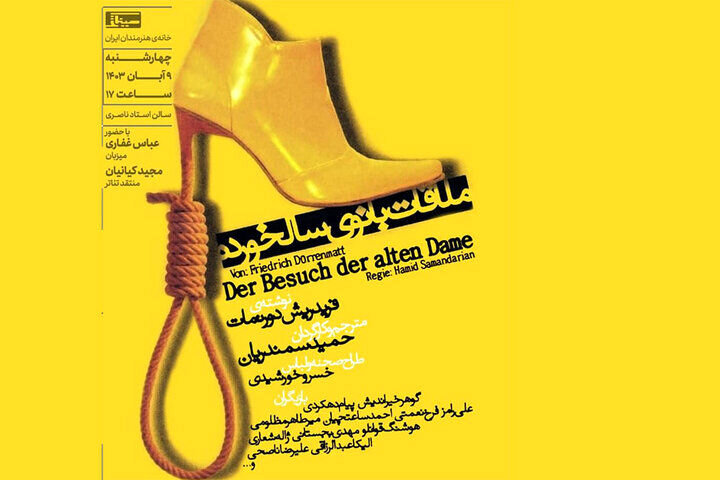IAF cinematheque to show Hamid Samandarians The Visit
IAF cinematheque to show Hamid Samandarian’s “The Visit”
TEHRAN-The recorded stage performance of the 1956 play “The Visit” written by the Swiss dramatist Friedrich Durrenmatt, which was directed by the late Iranian stage director Hamid Samandarian in 2007, will be screened at the cinematheque of the Iranian Artists Forum (IAF) on Wednesday.

The screening, set for 5 p.m., will be followed by a review session with Abbas Ghaffari as the host and theater critic Majid Kianian, Honaronline reported.
“The Visit” was translated into Persian by the celebrated director Samandarian, who also staged the play several times between 1972 and 2008.
The play is about a wealthy old woman, who returns to her hometown after 45 years to exact revenge on the man who betrayed her when she was young. She asks townspeople to kill the man and in exchange, she promises to provide enough money to revitalize the decrepit town.
Samandarian had called “The Visit” a thought-provoking comedy. “Dürrenmatt was labeled a melancholic writer in Germany, and some renowned analysts believe him to have been an author who was able to portray anti-human events without fear. When I was studying his works, I also found out that Dürrenmatt was very strict and daring, and he was candid when narrating the truth.”
“One can hardly find the opportunities in life to apply all the hidden characteristics within oneself and this may happen only when forced by life. Dürrenmatt relentlessly depicted man perfectly in all possible situations and that is why some of his colleagues opposed his opinions and works,” the director had noted.
“During my studies, I figured out that Dürrenmatt portrayed the most expressive form of evolution of mankind in his plays ‘Play Strindberg’, ‘The Visit’, ‘The Marriage of Mr. Mississippi’ and ‘The Flat Tire’. In the eyes of Dürrenmatt, there was no absolute tragedy. Society commits crimes and no one feels guilty – therefore, there is no tragedy in its absolute meaning – what is left over is only tragic laughter aroused by feelings of anger and unhappiness.”
Hamid Samandarian (1931-2012) was an Iranian film and theater director and translator. He staged numerous dramas including “No Exit” by Jean-Paul Sartre, “Ghosts” by Henrik Ibsen, “The Glass Menagerie” by Tennessee Williams, and “Marriage of Mr. Mississippi” by Friedrich Durrenmatt.
Having established many acting and directing classes and workshops, Samandarian trained many Iranian actors and directors including; Ezzatolah Entezami, Reza Kianian, Golab Adineh, Mehdi Hashemi, Shahab Hosseini, Parviz Poorhosseini, and Ahmad Aghalou, among others.
Dürrenmatt (1921-1990) was a Swiss author and dramatist. He was a proponent of epic theater whose plays reflected the recent experiences of World War II. The politically active author's work included avant-garde dramas, philosophical crime novels, and macabre satire.
Like the German expatriate writer Bertolt Brecht, Dürrenmatt explored the dramatic possibilities of epic theater. Next to Brecht, he has been called its “most original theorist”.
Dürrenmatt, who was educated in Zürich and Bern, became a full-time writer in 1947. His technique was clearly influenced by Brecht, as in the use of parables and of actors who step out of their roles to act as narrators. Dürrenmatt’s vision of the world as essentially absurd gave a comic flavor to his plays. Writing on the theater in “Problems of the Theatre” (1955), he described the primary conflict in his tragicomedies as humanity’s comic attempts to escape from the tragic fate inherent in the human condition.
SS/
source: tehrantimes.com